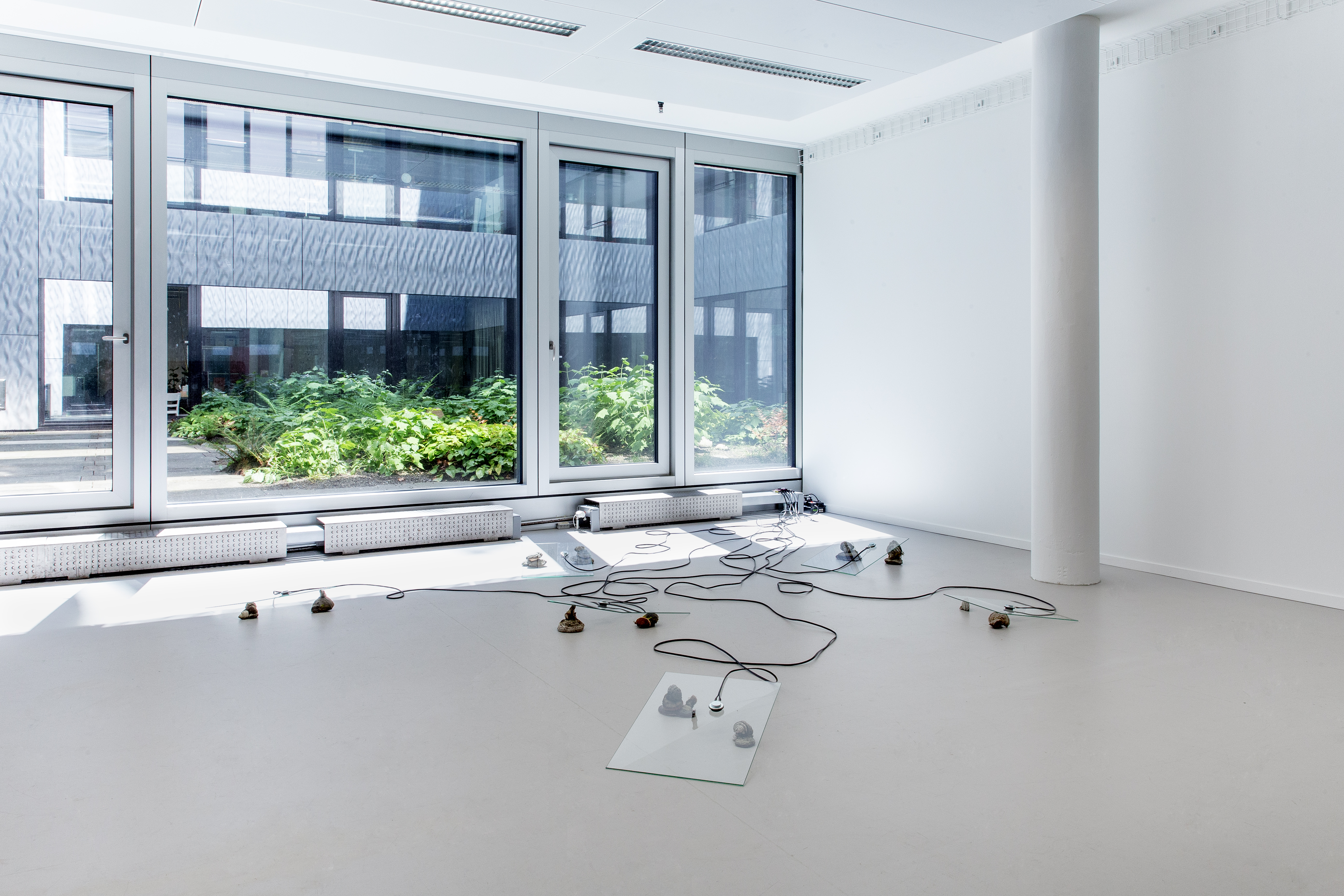
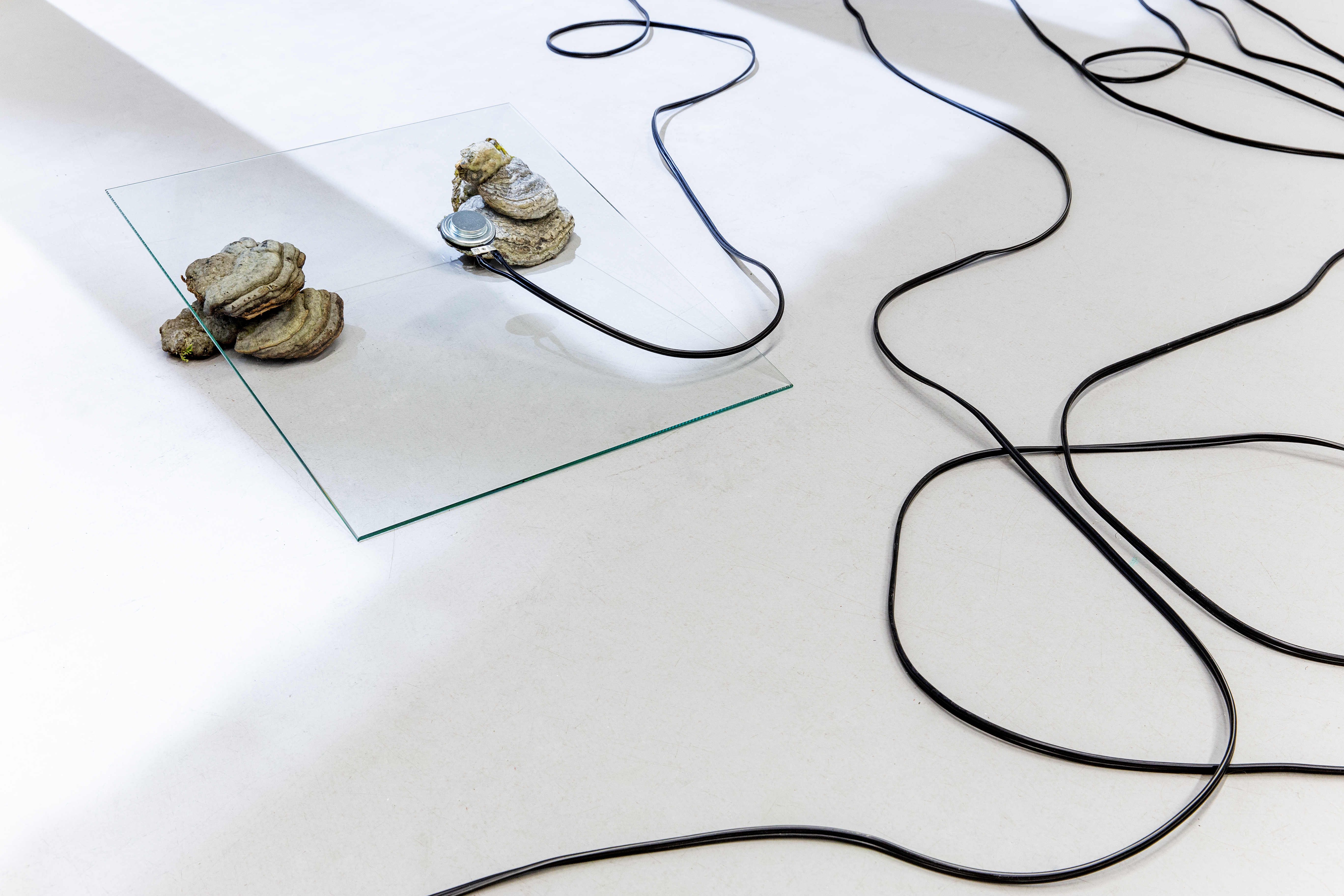

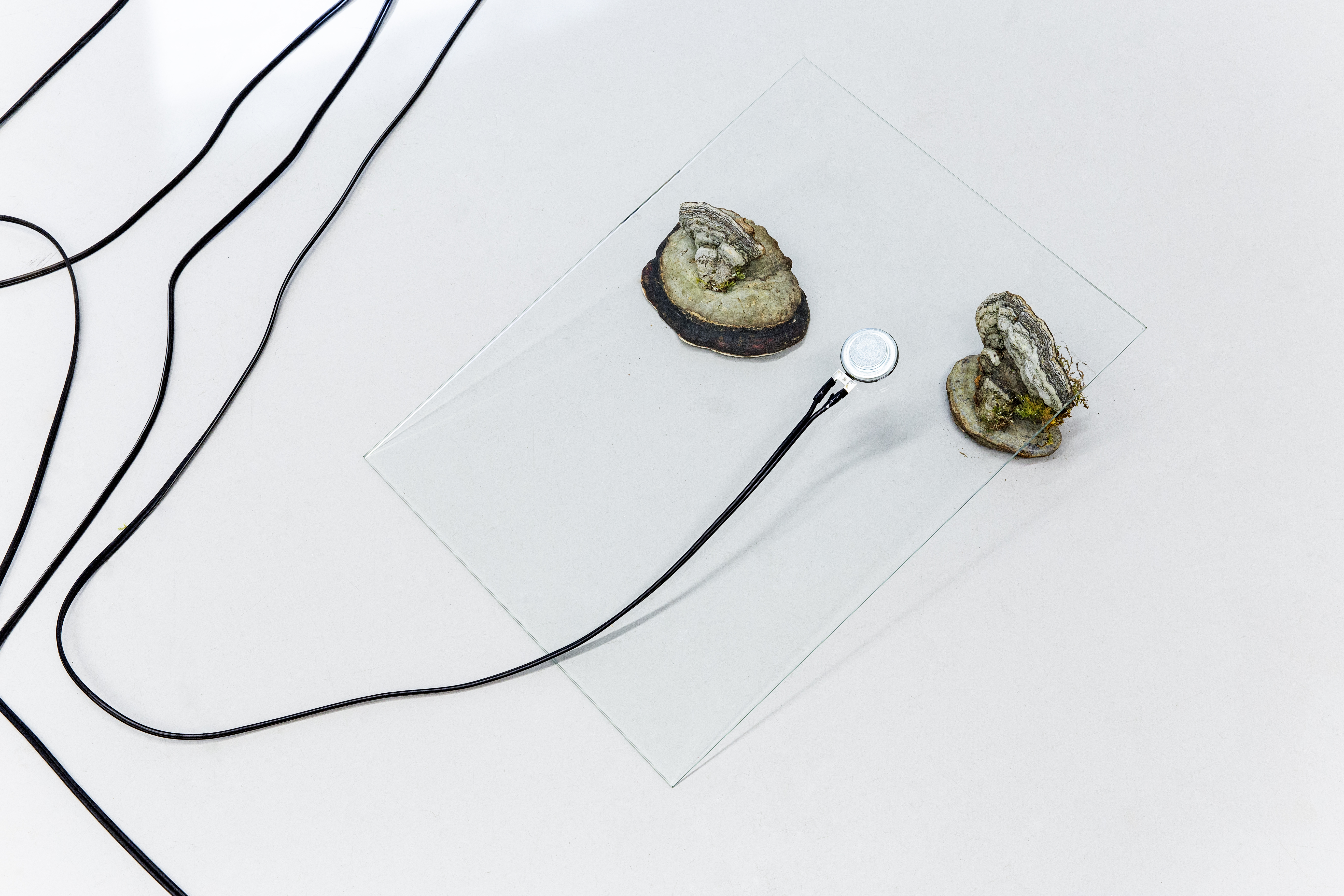
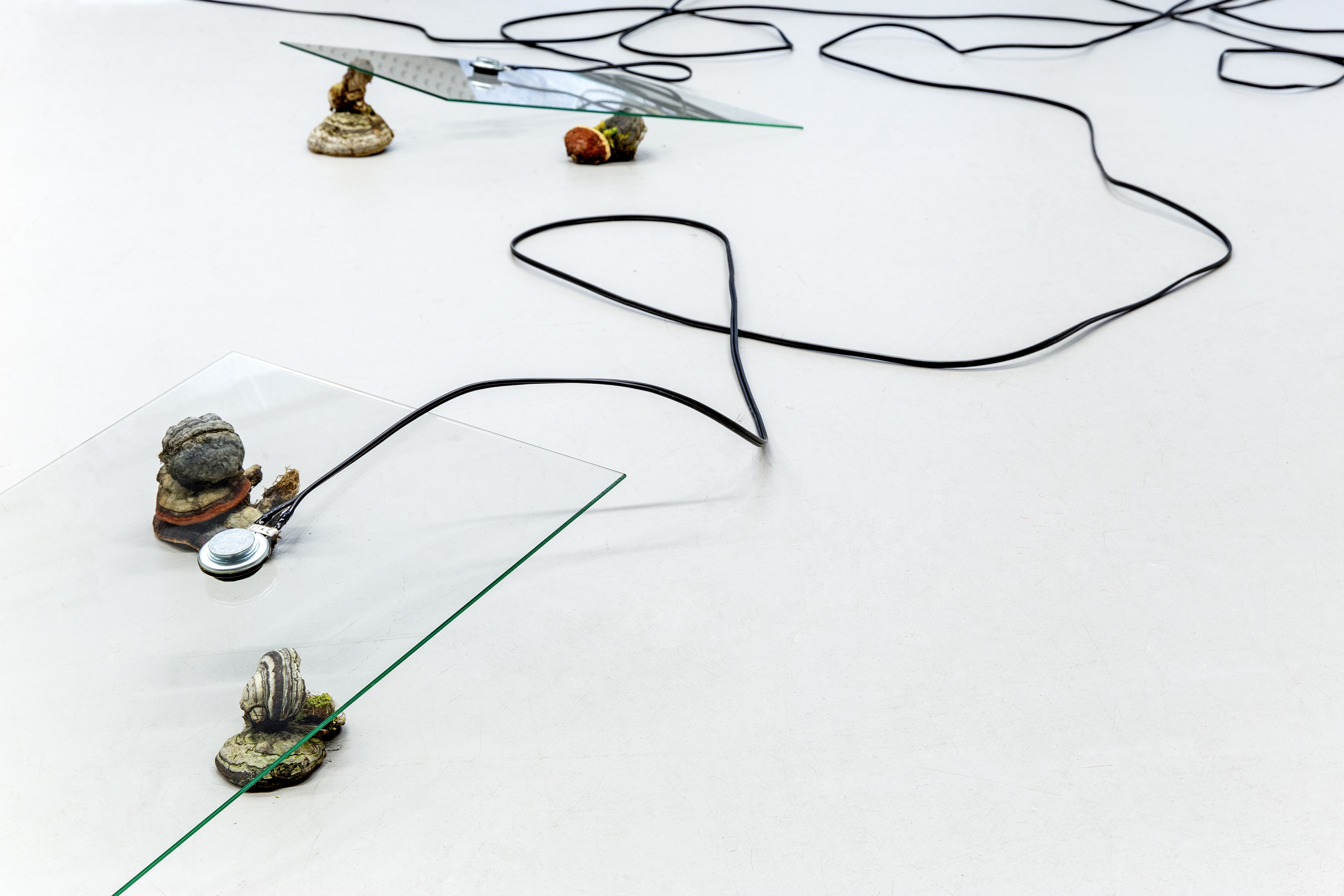
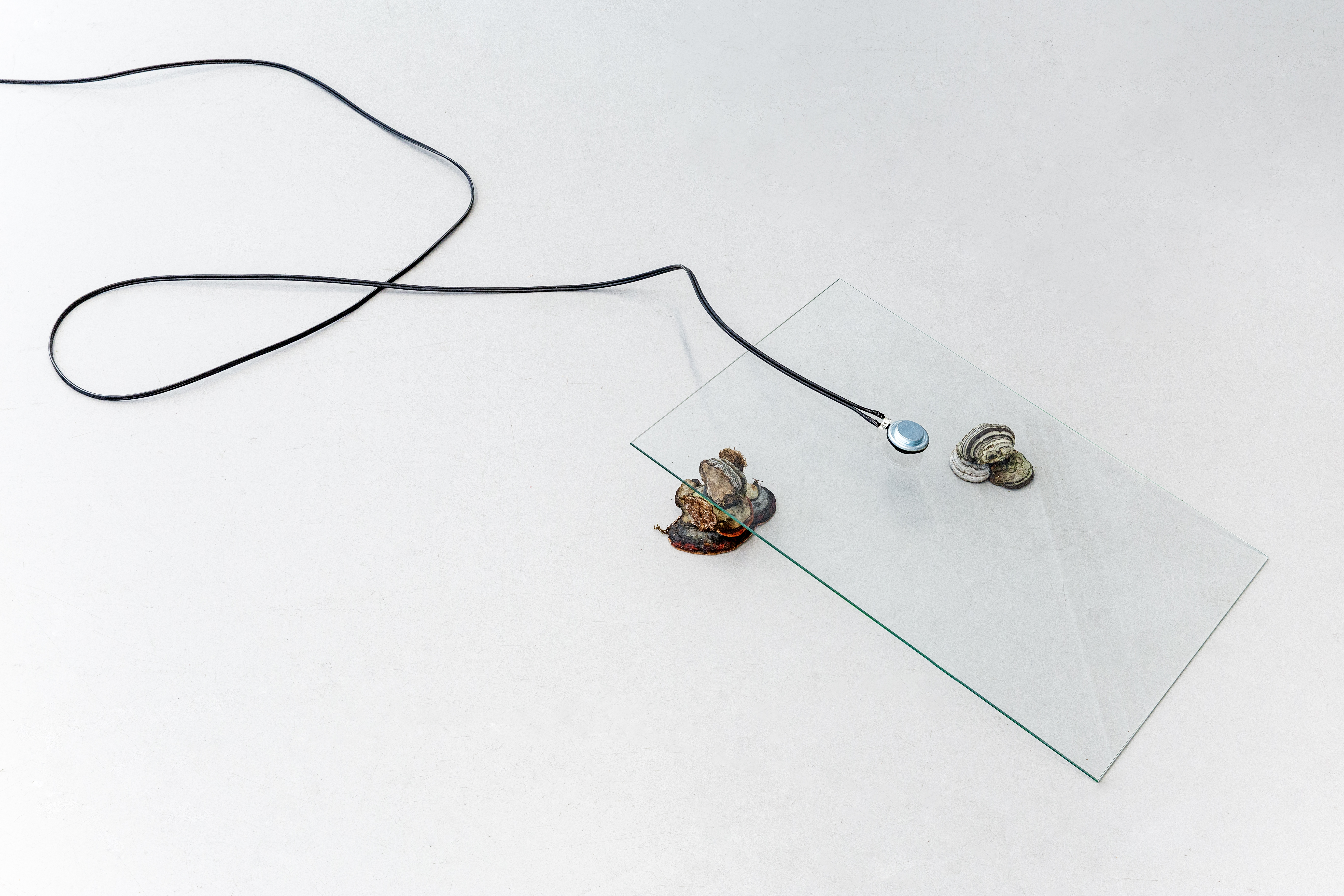
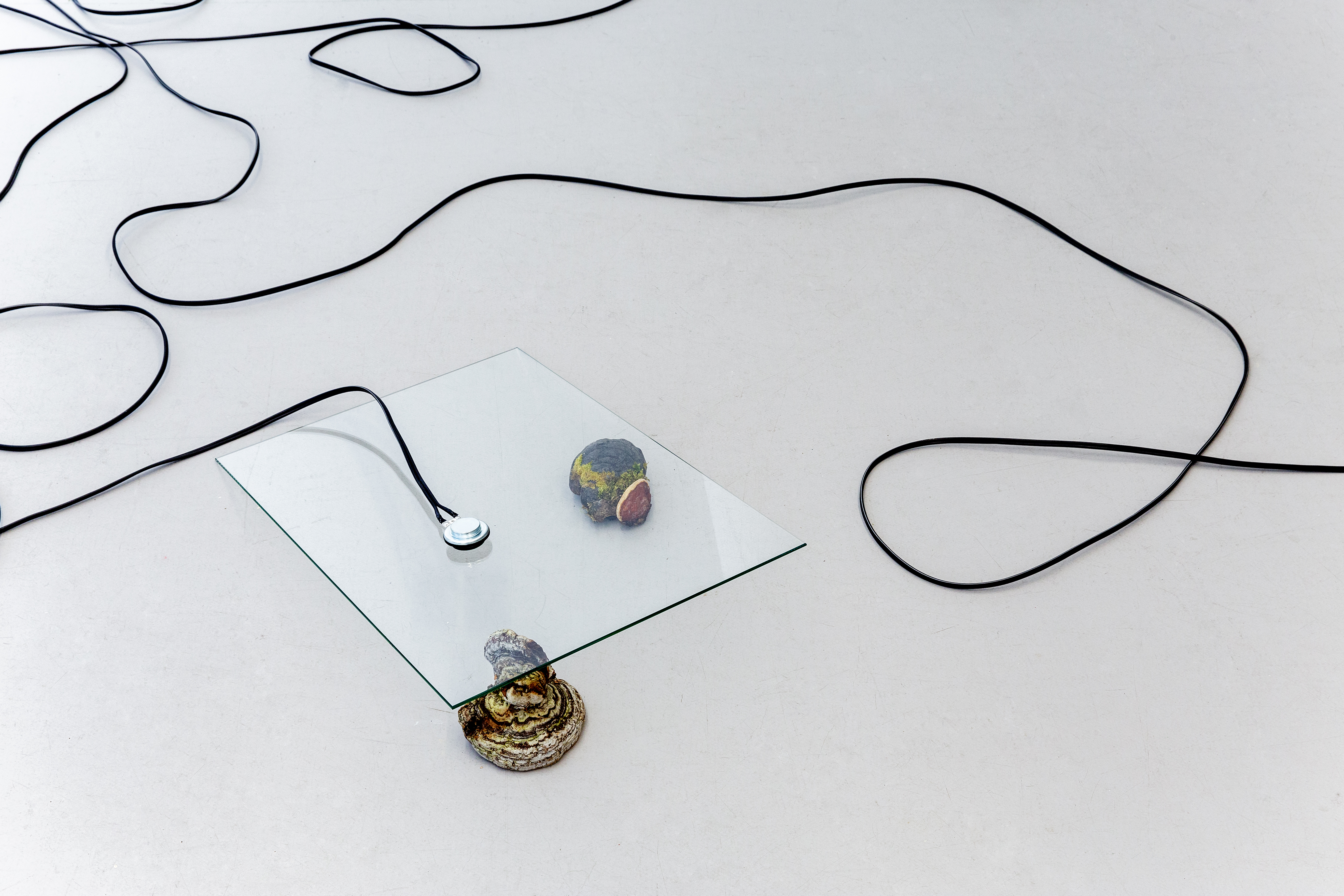

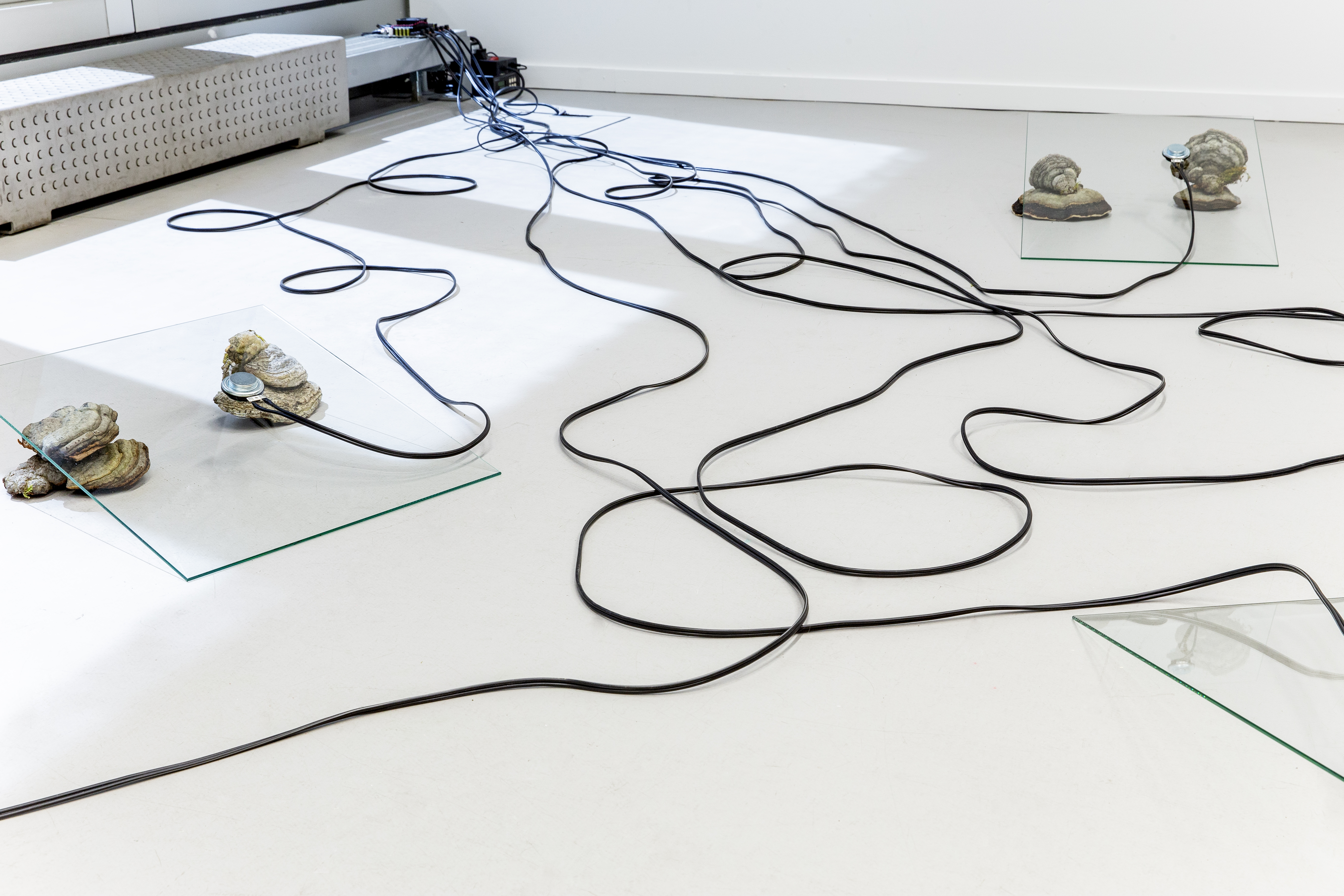
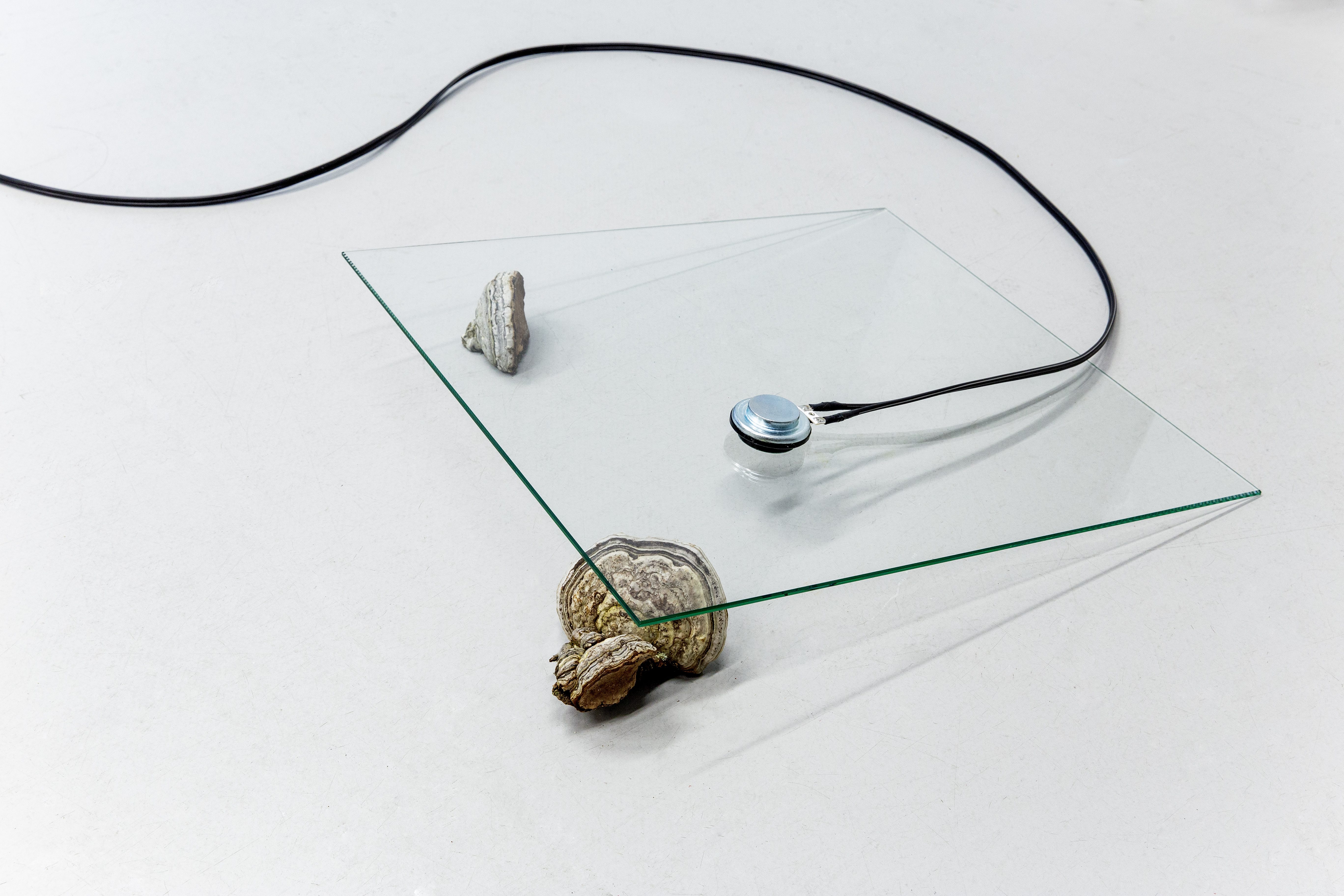
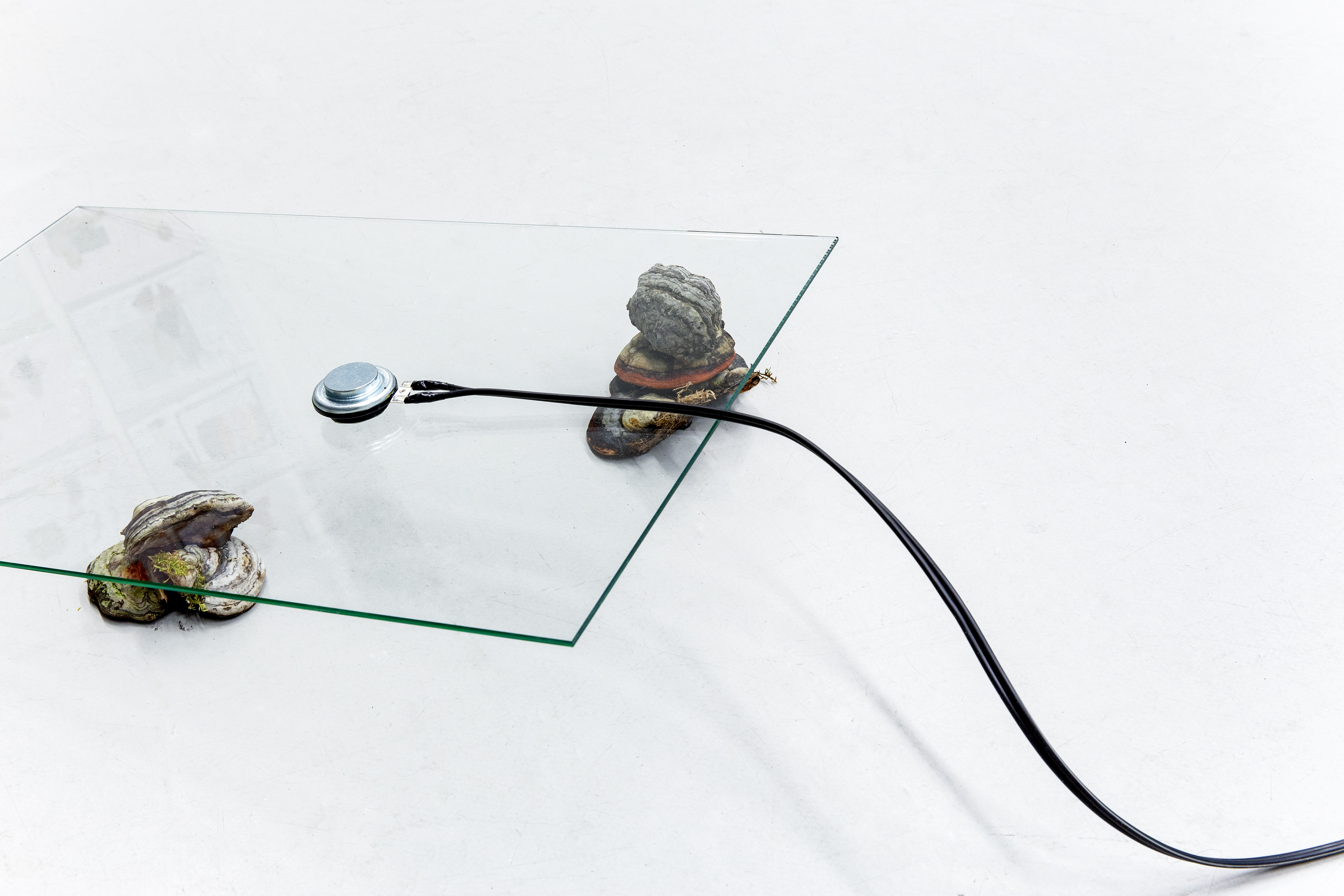
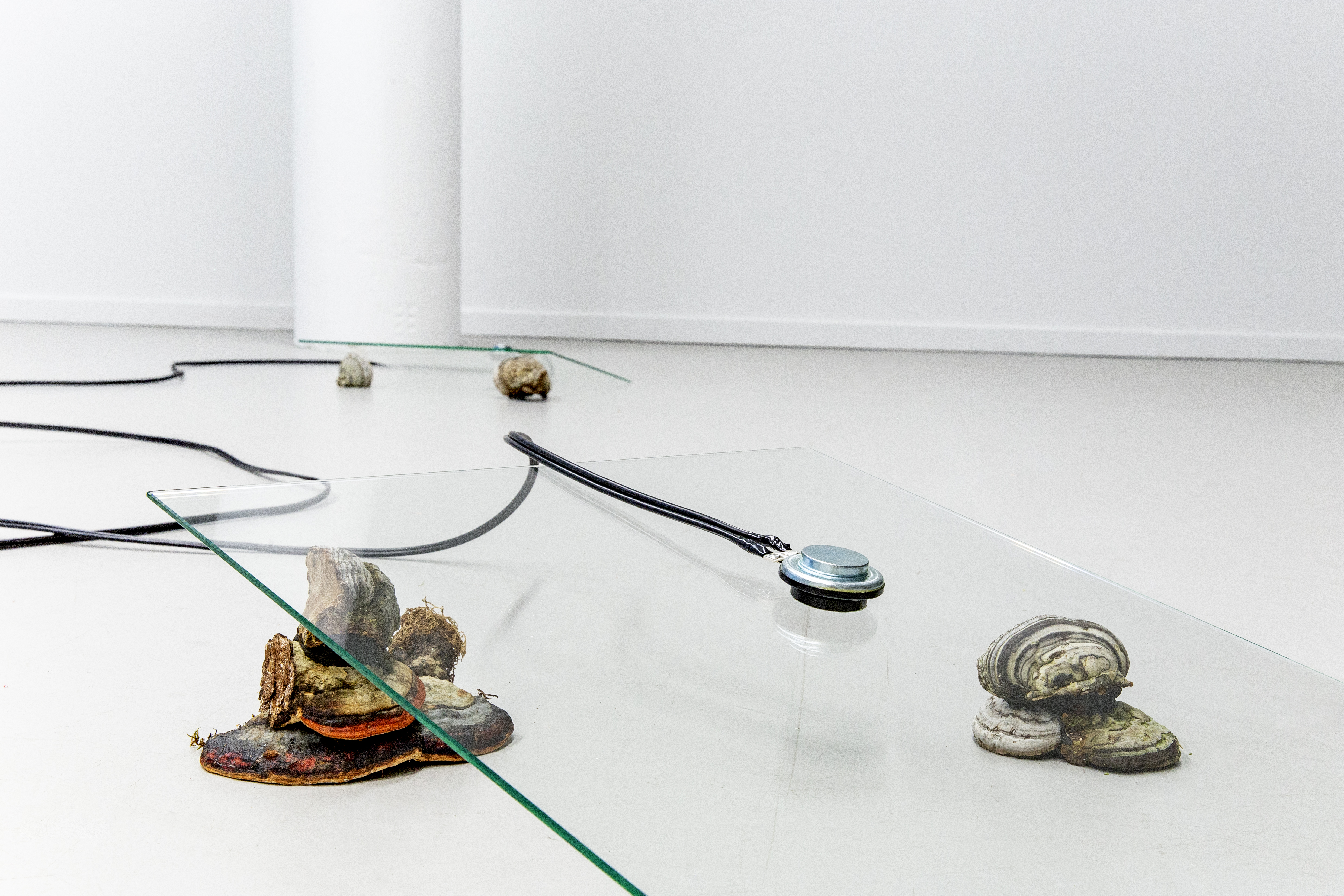
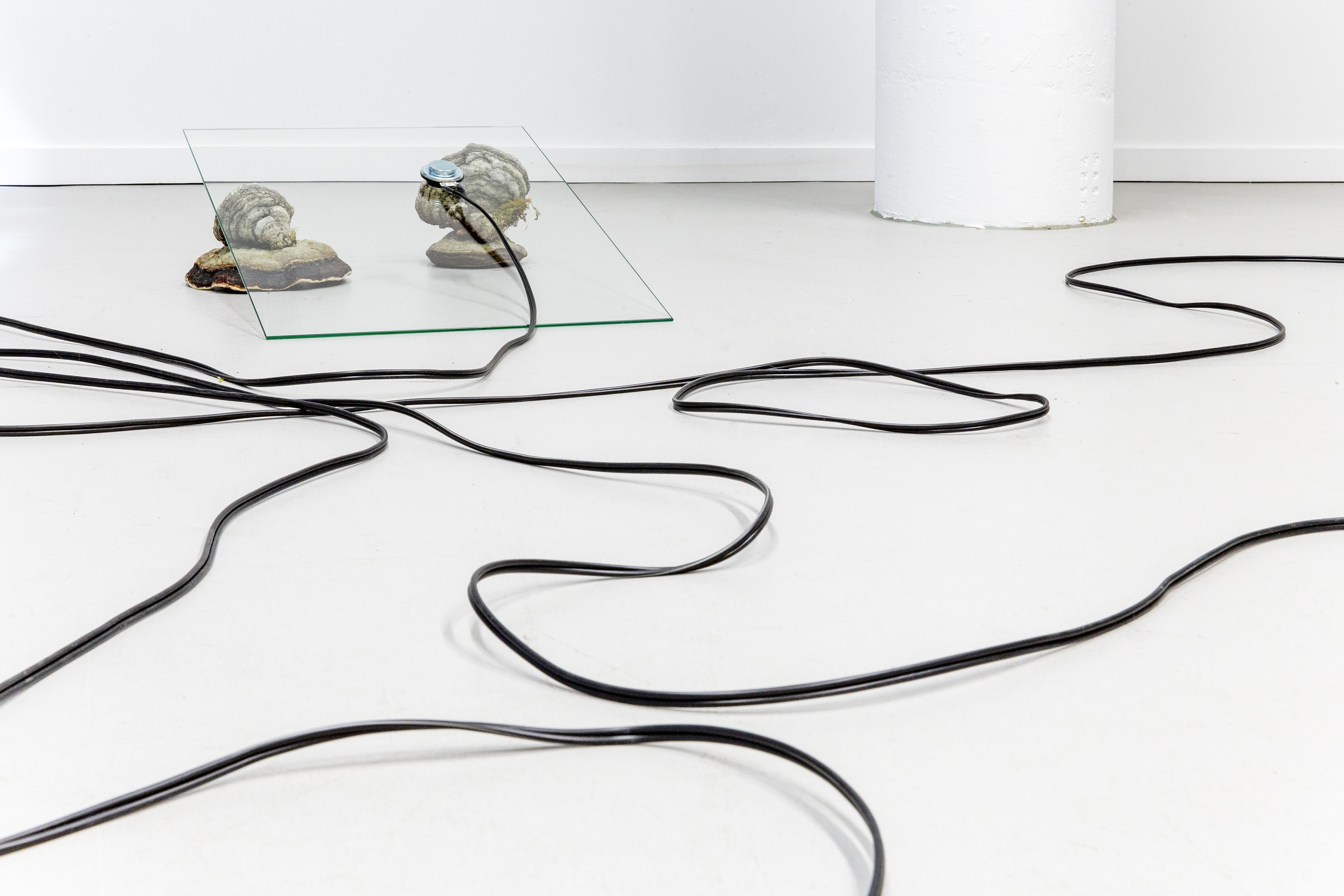
Ubiquitous Blow (2023)
Mixed media installation
6-channel audio, looped, 43 min.
Glass, transducers, Turkey Tail mushrooms
Dimensions variable
Ubiquitous Blow follows a practice of critical fabulation and musical composition as a means of voice production while asking: who/what gets to speak, gets to have a voice? How can space be generated for disappeared voices or voices never considered voicing? Who’s listening?
The audio in the work is a duet between a Ghost Fiddle (wet-finger-around-the-wine-glass method) composition and a polyphonic narration. It employs sheets of glass as membranes when emitting the sound in the exhibition space via transducer vibrations.
In conversation with the material elements of the installation, the narration negotiates ideas on sensory attunement, interspecies knowledge transmissions, and collaboral survival. For a group of unvoiced beings, a collective body referred to as a we, the materiality and production method of glass becomes a medium for regaining the sonority of their language.
Hacking the process of producing mouth-blown glasses, human voice and saliva is embedded into the material while it is being shaped from within by human breath: by the interior of the glassblowers. The we orchestrates the affair knowing that the produced objects, when played, will eventually emanate their embedded voices and stories, letting them resonate in space and be heard.
We were all part of it. All part of all of it, remember?
Once we got started, there was no stopping. We wanted it.
We had been deprived of the right to have a voice. Of our prerogative to have a sexuality. Even to have a body.
Before the event, we had always been too much body, too much voice, too much signification. We had been both/and, neither/nor, all of the above/none of the above. Non-fitting.
We had been living through the filter of ‘but’. Being explained away. Being gradually disappeared until our materiality had languished, and we were left in the dust as lumps of drowsy consciousness. We had lost our physicality, we had lost our voice, and our thinking was dying.
Without a body, how could we ever again experience the exchange of warmth from touching other bodies? Of presence, the proximity of otherness bringing an other as close as our self?
Without a body, without a surface, how could we touch ourselves and experience a sense of the otherness within? How would we touch and hold our immaterial self?
There were periods of paralysation, and there were times when we could think of no possible way out of our suffering.
But gradually, our brain fog lifted, and we entered a long phase of slow recovery. We developed self-care strategies. Methods of touch through self-touch, touching our immaterial selves with the brush of our memory. Self-attunement by self-remembering. It was a tedious time. The unknowing and the loneliness was numbing.
Inner and external energies came round, and we brought off our most parasitical behaviour, gathering and storing every form of nutrition beneficial for our physicality coming our way.
During the incubation period, we had trouble remaining conscious. It was a peculiar sideways sensation of being stretched and compressed concurrently in a pulsating bend of dimensions. But after the hatching, we saw that we had attained a physical form, had entered a microbial state. We were with surface, and also, we were with hearing.
This was when we understood that we were not alone. That many others shared our destiny and that they were right beside us. Our communal urge quickly brought us close.
By practising long-term skin contact with each other, we strengthened and maintained our surfaces. Practising sensory attunement, nonverbal communication. Transferring information between us in a continuous flow. Each being respons-able for the other, for being in touch with the other. It was an agreement of reciprocal wet nursing, an operation of sociality. It was survival through knowledge transmission.
We had no voice, but we had the ability to listen. So, we listened to the echoes of each other’s former voices, faintly resonating in space. Repeatedly performing deep listening for each other, imitating, remembering, miming referencing, and adding to each other´s thinking. In this way, recreating our former voices, letting the agency of our language expand through our reverberations.
It was a feedback loop. A bundle of organic lines, a flourishing ongoing joining in an amoeban collective body.
Ever shifting, ever spinning off into new variations of ourself. We did some of our best thinking during this time.
What was our motivation for our relocation? The details elude our collective memory. But what it brought us was a real game changer. We came upon a heap of sand, and before we knew of it, we were interfacing our mutating surface with the grains, making them our extended family. We exchanged stories, we learned about the nature of their cycle. How they, by means of certain external forces, would later transition into glass and eventually be ground back into sand in a recycling process, as was the nature of their vocation.
It became clear that in their periods of being glass, we were related in our none-of-the-above-ness. In this shape, they were neither fully liquid nor fully solid. Deep down, a liquid but structurally sound enough to stand and to hold other liquids. They shared with us the same slippery way of being in the world, of being forever unfitting, and we were coming with them.
From their patience, we discovered that time is our friend and collaborator. We spent time educating ourself, through our collective and expanding knowledge. We learned about the glass blowers. Proud people with powerful lungs and saggy cheeks who were going to give us our form in our makeshift bodies. We understood that they would shape us with their breath. That the glass blowers would breathe into the material, which would by then be us. Sculpting, becoming part of and marking us on the inside by means of their own interior.
It was obvious that we had found our medium, our gateway to expression, to again hold the sonority of our language, to being heard.
When we met with our exterior forces, when we were eventually picked up, things immediately started going our way. We were ready and well prepared. The infection was a swift deed. We took our time cultivating and reproducing ourself through the visit while civilising our host for our purpose. We were able to alter our gaffer’s neural network, prepping the system for our realisation, making sure nothing was forgotten.
From our waiting position in a pocket of warm lung tissue, we were shot with the first blow back into the material, enveloped by breath and saliva. We relished in the sensation of being inside and outside simultaneously, being creator and created, giver and receiver. Our host sang our stories into the scorching glass giving us our shape by blowing our own voices into us, embedding them in the molecules of our molten liquid.
We were a ubiquitous blow, coming from everywhere all the time.
Oh yes, we knew it would only be a matter of time before someone would employ our edges as musical instruments, rubbing wet fingers along their rims in precise stick-slip motion, making us sing through the vibrations. And in that moment, at the first circular tickle, all our suppressed voices projected themselves through space, travelling through bodies, pushing against the architecture.
We found a new generation of hosts in our listeners. Any living organism moving in the same space as our acoustic expression. Through their listening, through their bodies carrying our waves beyond themselves, we gained a material presence. Influencing the social organisation of these beings in their situational dramas, conversing with the spatial confines of their mental reverberation. We felt the ebb and flow of our
crowd, we were showing them what love sounds like, we masturbated through our listeners' ears.
But also, we were a choir of chaos, of interruptions, shouting and whispering in rhythmic unison, on top of each other, in chorus, in changing harmonies.
We experimented with acoustic levitation, and we began to realise the ultimate potential of our endeavours, the soft power of our violence. That we would let our listeners fall on the hardness of our language, that we would sing our own infrastructure to pieces. Letting ourself fall into the rift of language, feeling the saliva from the finger-licking performer slowly sliding down through cracks in the glass, mixing with the saliva of the glass blower. Grinding ourself back into sand with our own voices.
Leaning all the way into our ecosystem, letting it work for us as we work for it. Staying in the transition, growing through each cycle.
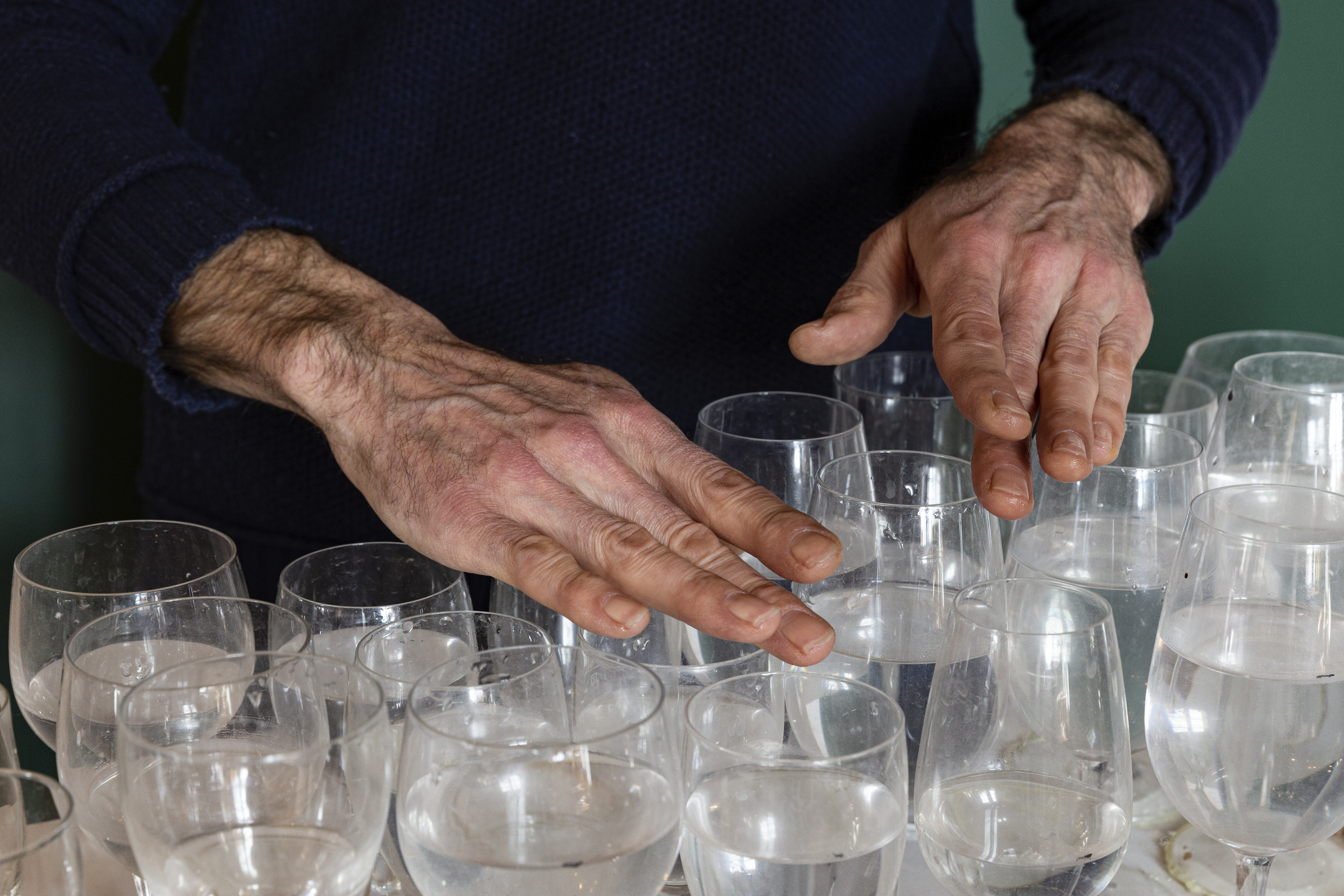
Ghost Fiddle player: Florian Wagner